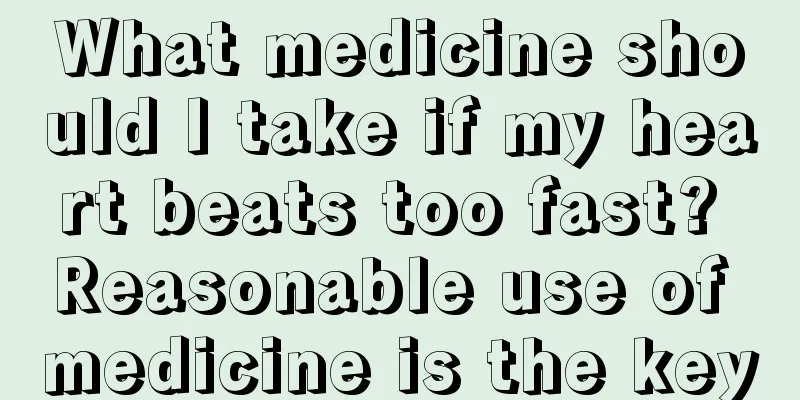What medicine should I take if my heart beats too fast? Reasonable use of medicine is the key

|
There are pathological and physiological causes of tachycardia. It can occur after strenuous exercise, excessive emotions, drinking large amounts of alcohol, coffee, or strong tea. If it occurs frequently, you should take medication under the guidance of a doctor in a timely manner and do not use medication indiscriminately. 1. Beta-blockers By blocking beta-receptors, it slows the heart rate. It is a commonly used drug to slow down the heart rate. For patients with good heart function, prone to tension, and high blood pressure, short-acting propranolol (Inderal) can be used, 5 to 10 mg each time (10 mg per tablet) orally, 2 to 3 times a day. Medium-acting metoprolol (Betaloc) is taken orally at 12.5 to 25 mg each time (50 mg per tablet), twice a day; or atenolol (Atenolol) is taken orally at 12.5 to 25 mg each time (50 mg per tablet), twice a day. Or long-acting bisoprolol (Concor, Bossu), 5 mg orally each time (5 mg per tablet), once a day. If the heart rate is slower than 60 beats per minute, discontinue use. 2. Calcium antagonists For example, non-dihydropyridine calcium channel blockers have an inhibitory effect on the sinoatrial node, slowing down the sinus heart rate. Commonly used ones include verapamil (Isapamil), which is suitable for patients with good heart function and high blood pressure. It can be taken orally at a dose of 40 mg each time (40 mg per tablet), 3 times a day, or with sustained-release tablets, half a tablet each time (240 mg per tablet), once a day. It may occasionally cause adverse reactions such as hypotension, lower limb edema, dizziness, and vertigo. If the heart rate is slower than 60 beats per minute, discontinue use. There is also another non-dihydropyridine calcium channel blocker called diltiazem (Tianerxin), which does not slow down the heart rate as well as verapamil, but also has a blood pressure lowering effect and can relieve coronary artery spasm. It is suitable for patients with angina pectoris caused by coronary heart disease accompanied by hypertension and rapid heart rate. Take 1 tablet (30 mg) orally 3 times a day. Or sustained-release capsules, 1 capsule (90 mg) each time, 1 to 2 times a day. Adverse reactions such as dizziness, flushing, headache, constipation, hypotension and bradycardia are occasionally seen. 3. Digoxin It is a cardiotonic drug. By stimulating the vagus nerve, the heart rate is reflexively slowed down. Suitable for patients with tachycardia and poor cardiac function. Take half a tablet to 1 tablet (0.25 mg each tablet) orally, 1 to 2 times a day. Be aware that this may cause gastrointestinal disturbances. 4. Reserpine It is a peripheral adrenergic blocking drug. Suitable for patients with hypertension and rapid heartbeat. Take 1/2 to 1 tablet (0.25 mg per tablet) orally, 2 to 3 times a day. Excessive dosage can cause fatigue, weakness, headache, depression, anxiety, impotence, etc. Vomiting, stomach pain, bradycardia, bronchospasm, etc. are rare. It should be used with caution in patients with a history of depression, peptic ulcer, tremor paralysis, pheochromocytoma, etc. |
<<: What does it mean when big triple positive turns into small triple positive
>>: What is the best way to treat cervical lymphadenopathy?
Recommend
Can headache be diagnosed by CT?
Headaches are a condition that many people experi...
The process of transforaminal endoscopic surgery
As we all know, perforaminal endoscopic lumbar di...
What are the effective ways to prevent lung cancer? 13 things to pay attention to in preventing lung cancer
Everyone will develop various diseases. In today&...
What are the characteristics of water-based nail polish
For female friends, nail polish can be said to be...
How to remove walnut juice from your hands
Walnut is a nut that is very abundant and benefic...
What should liver cancer patients pay attention to when conditioning their bodies? Three common mistakes in liver cancer rehabilitation conditioning
In the early stages of lung cancer, the cancerous...
How to wash the motor oil off clothes? Tips for removing motor oil
Motor oil is probably one of the most difficult s...
Early symptoms of endometrial cancer in women
As our economy continues to develop, our lives ar...
How to effectively treat dyshidrotic eczema
Dyshidrotic eczema is actually a type of dyshidro...
The recurrence rate of laryngeal cancer surgery is too high
Laryngeal cancer can be divided into primary and ...
What are the types of ovarian tumors?
Ovarian tumors are a relatively common type of gy...
Four typical symptoms of breast cancer
Breast cancer is a disease that women often suffe...
Symptoms of foot fracture
The parts of the body most prone to fractures are...
What are the treatments for corticotropinoma?
Many people don't know much about adrenocorti...
How to remove oil stains from clothes
Every time I wash clothes, I feel depressed when ...









